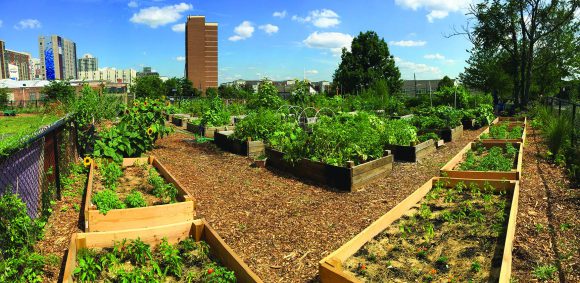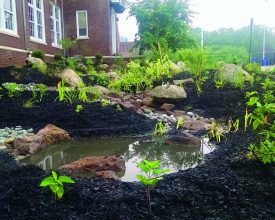
Shiloh Community Garden.
The Shiloh Community Garden in downtown New Brunswick has been the focal point of a unique health project that seeks to foster positive physical, emotional, and social health outcomes for an underserved city population: uninsured clients of Elijah’s Promise Soup Kitchen. These clients, who receive free primary care through the Promise Clinic, a volunteer clinic run by medical students associated with Robert Wood Johnson Medical School, obtain gardening skills while they learn about healthy food and improving personal health.
Through the efforts of Richard Alomar, assistant professor, and Megan Pilla, graduate student, in the Department of Landscape Architecture, sketching at the Shiloh Community Garden has been integrated into the community-based project. Pre-and post-health assessments will evaluate whether the experience leads to positive health outcomes, and sketching journals will document the work recollections and attitudes of the participants. The results will inform future Elijah’s Promise programming, community gardening expansions, further scholarship in community-based health, and an expanded study. The project, a collaboration of Elijah’s Promise, the Robert Wood Johnson Medical School, and Rutgers, is funded by a Community-University Partnership grant.

Community rain garden.
Another innovative garden project involves the creation of a rain garden in the Township of Springfield as an educational tool to be used by teachers to tell the story of stormwater and biophysical systems. The 3,000-square-foot front garden at the Jonathan Dayton High School is a functional and educational arrangement of landform, stone, concrete, plants, and water as expressions of New Jersey’s unique physiography. The “Jersey Rain Garden” represents geology and plant communities across the state, from the landscapes of the Valley and Ridge, Highlands, and Piedmont to the Coastal Plain.
“Anthropogenic” or human-made stone is not ignored either. In the Piedmont garden, an area of broken concrete from the town’s transfer station forms one of the weirs that control the flow of stormwater across the garden. This construction in reused concrete demonstrates the “green infrastructure” concept of pavement removal or modification to reduce stormwater runoff and encourage infiltration. Signage and educational materials will help tell the story of the systems model, explaining how rain gardens work ‘biomimetically’ with natural principles to improve water quality, create habitat, and integrate distinctive landscapes into town properties.
Tobiah Horton, extension specialist in the Department of Landscape Architecture, worked with the Board of Education and Department of Public Works of the Township of Springfield on this project, which was funded by the two township entities and a Sustainable Jersey Grant.
Editor’s Note: This story originally appeared in the New Jersey Agricultural Station’s 2015 Annual Report.

